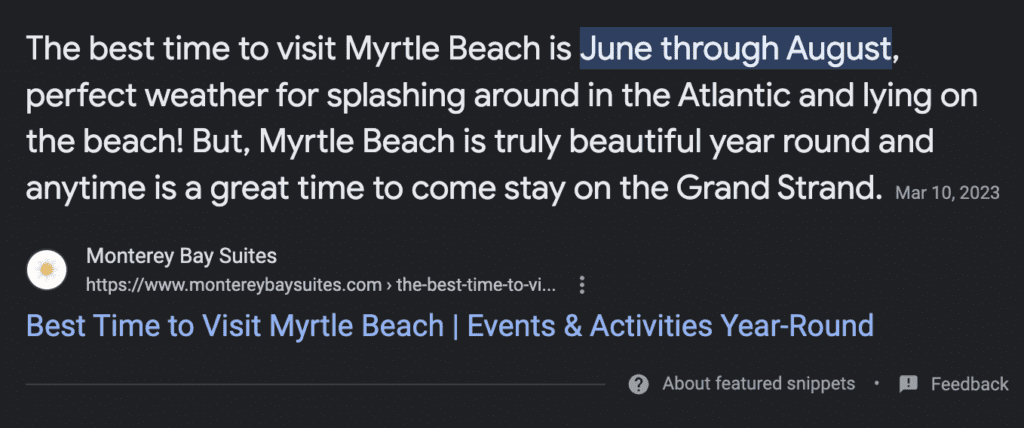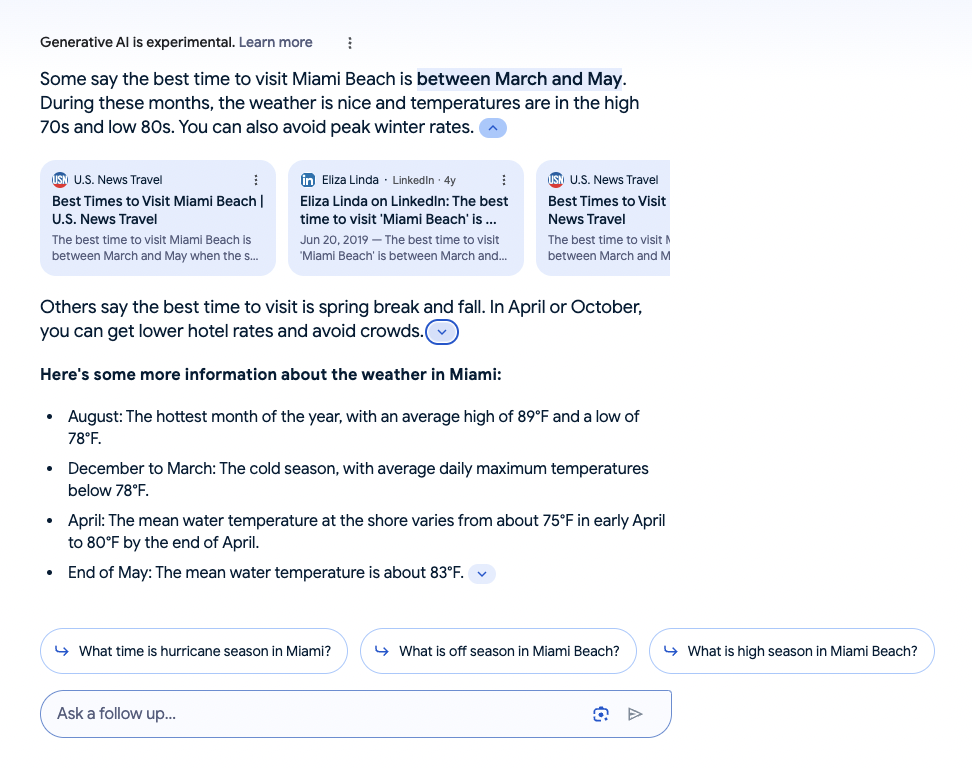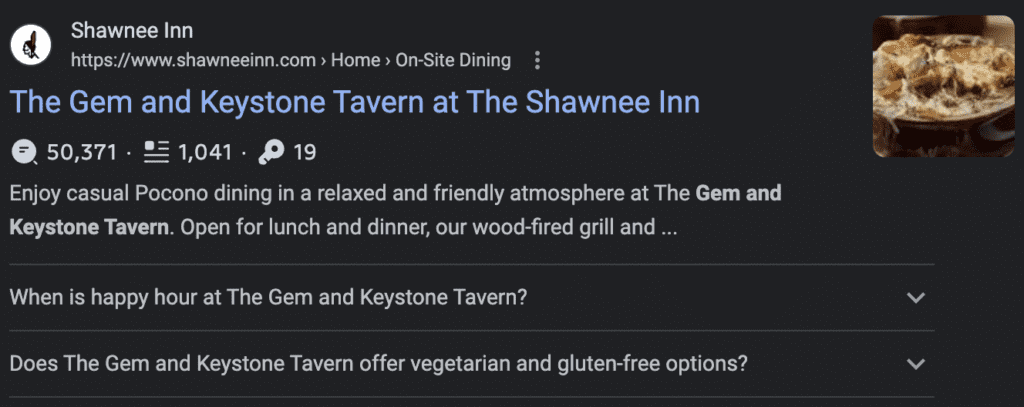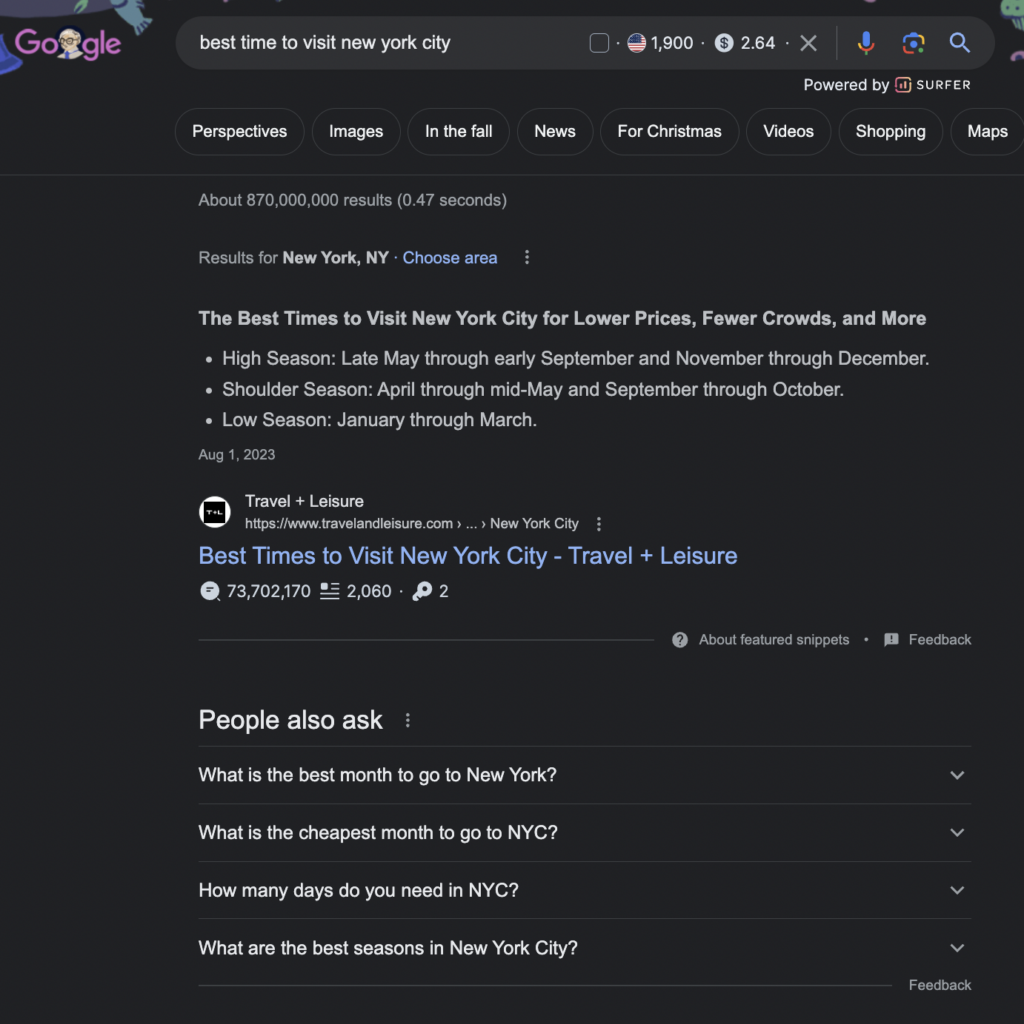6 SEO Tips for Hotels & Trends to Follow in 2024
by Jeremy Razook
Ready to stop being a hidden gem and become a sought-after destination?
This article dives into the hotel SEO trends and actionable tips that will help boost your organic rankings in 2024.
Align your 2024 digital marketing strategy with these powerful trends and SEO tips for hotels.
Here’s a summary of what you’ll learn:
- Optimize your hotel website for local SEO
- Focus on featured snippets
- Publish content that’s helpful to your hotel guests
- Prioritize for search intent
- Create content that converts
- Continue to follow SEO best practices
Optimize your hotel website for local SEO
Beef up your local SEO efforts and you can expect more people discovering your hotel in 2024. If you’re not already familiar, we recommend getting acquainted with local SEO for hotels.
Below are some starting points for your 2024 local SEO strategy:
- Google Business Profile optimizations (upload images, add amenities, answer questions, create posts, etc).
- Optimize your webpages for local-specific searches.
- Publish local-specific content like blogs, area guides, and FAQs.
- Build backlinks from local travel and tourism websites.

Focus on featured snippets
Featured snippets on Google are one of the best ways to boost your SERP real estate and drive more traffic to your website.

In many cases, featured snippets are generated by long-tail searches that are informational in intent. Think “best time to visit *destination*” or “things to do with family in *destination”. Because these searches don’t typically have a correct answer, this leaves a lot of room for the publisher to be creative with their answers.
With the introduction of Google’s AI-powered search experience, web searching is being reimagined to be more conversational through long-tail searches. This potentially presents more opportunities for hoteliers to claim more SERP real estate.

Publish content that’s helpful to your hotel guests
Hotels are in the business of hospitality, so it only makes sense that a hotel’s website be as helpful as possible to all site visitors. From answering FAQs to in-depth area guides, hotels should be presenting information that is worthy of a share or a bookmark.

In addition to the content you publish, take into consideration how you’re presenting that information. Ensure the article is formatted for readability and usability. This means ditch the waterfalls of text on mobile and opt for bite-sized paragraphs that are separated by headings, and so forth.
In fact, Google has made a push in recent years to improve its organic search experience by rewarding content it deems helpful.
Prioritize for search intent
Before you publish any content, you need to understand the intent behind the search you’re optimizing for. If not, how do you know the content that you’re publishing is actually helpful?
- Is the searcher looking to book now?
- Are they in the research phase?
- Is the searcher looking for information about the area?
- What information would make the searcher’s life easier?
Understanding where the searcher is in the booking cycle will help you determine the type of information you should be publishing. Semrush’s Keyword Magic Tool includes its own Intent column. This shows the purpose of a search in a search engine.

During your initial research, use Google to your advantage. Make a search for the keyword that you’re optimizing for. What results appear? What type of content are competitors publishing? Is there a featured snippet present? People Also Ask? What are the similar searches? Use this information as a guideline to what you should be including in your content and how you can make your content 10x better than your competitors.

Create content that converts
Getting more traffic to your website is great. But getting more traffic to your website that converts is even better. Hoteliers should get in the mindset of retaining site visitors in some way, shape or form.
Whether it’s a room booking, a newsletter sign up, or a contact us submission, the type of conversion will ultimately depend on the type of content a hotelier publishes and the intent of the search topic. This will require hoteliers to set proper expectations about the type of conversion to expect from the content they’re publishing.
With Google’s new AI-powered search experience, it’s possible that searchers may spend more time in Google’s search ecosystem. This makes the web traffic hoteliers get and the actions searchers take on their websites even more valuable.
Continue to follow SEO best practices
One thing remains constant for hotel SEO: best practices don’t go out of style. Ensure that your website’s images are optimized, headings are unique, and structured data is present. These are just a few of MANY best practices hoteliers should follow. But tackling these best practices, and incorporating the trends and tips above, will position your hotel website in good standing of reaching your digital marketing goals.
Whether you’re looking for assistance from a hotel marketing agency or just want to chat, contact TravelBoom. Or reach out for a free digital marketing evaluation of your hotel’s website and online efforts.